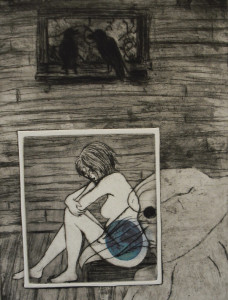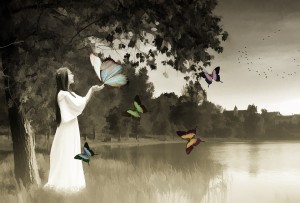Writing and "Tulpamancy"
At the end of August, Reply All ran a podcast episode called “Making Friends” that has been haunting me since I listened to it on a long drive a couple weeks ago.
The episode follows Shea, a 30-year-old woman who says she was about to commit suicide at age 16, when she heard a voice telling her to stop. She realized that the voice came from Jas, a character she had created for fan-fic she was writing. Over the years, she kept hearing Jas’s voice in her head, and says she essentially lived in two worlds: the real world, and the world she shared with Jas.
 One day, she stumbled upon a reddit forum for “Tulpas: Intelligent Companions Imagined Into Existence.” There, she discovered that other people also had these imaginary voices inside their heads. She became completely immersed in the “Tulpa” culture, creating more Tulpas and discussing Tulpa “techniques” with her new online friends. This included the idea of “fronting,” or letting your Tulpa take over your body/consciousness and live/speak through you. (Essentially, doing a character immersion exercise in which you let yourself live as your character for a while.) As she sank deeper and deeper into this world, Shea kept her new fascination secret from her husband, afraid that if she told him he would pressure her to go into therapy, that he would think she was crazy, etc. Eventually, the strain of keeping the secret ended up being too much for her. She told him, and within a year they were divorced.
One day, she stumbled upon a reddit forum for “Tulpas: Intelligent Companions Imagined Into Existence.” There, she discovered that other people also had these imaginary voices inside their heads. She became completely immersed in the “Tulpa” culture, creating more Tulpas and discussing Tulpa “techniques” with her new online friends. This included the idea of “fronting,” or letting your Tulpa take over your body/consciousness and live/speak through you. (Essentially, doing a character immersion exercise in which you let yourself live as your character for a while.) As she sank deeper and deeper into this world, Shea kept her new fascination secret from her husband, afraid that if she told him he would pressure her to go into therapy, that he would think she was crazy, etc. Eventually, the strain of keeping the secret ended up being too much for her. She told him, and within a year they were divorced.
He wrote a letter to the podcast explaining that, where he was concerned, Shea’s relationship with her Tulpa friends amounted to emotional infidelity, especially since two Tulpas who fall in love aren’t considered to be “cheating” even if their hosts are in committed relationships. And, one of Shea’s Tulpas had fallen for a friend’s Tulpa.
There are a few commonalities among most of those in the Tulpa community: they are often fans of science fiction and fantasy stories (check), they are often writers or other types of artists (check), and they often created their Tulpas in periods of isolation (check).
 I have never had an experience quite like Shea’s (mostly in that I have always kept my characters on a separate “level” and never allowed them to interact with me), but as a writer who has also lived a life alongside imaginary characters, her story stirred up a lot for me. I knew the feeling of living “two” lives — my own, and the lives of my characters. I knew the feeling of walking through my real life in a daze because I would rather be living the lives of people who didn’t exist. I also longed for a community where I could “come out” about my obsession with my own creations, although I did share them with my sister and a close friend.
I have never had an experience quite like Shea’s (mostly in that I have always kept my characters on a separate “level” and never allowed them to interact with me), but as a writer who has also lived a life alongside imaginary characters, her story stirred up a lot for me. I knew the feeling of living “two” lives — my own, and the lives of my characters. I knew the feeling of walking through my real life in a daze because I would rather be living the lives of people who didn’t exist. I also longed for a community where I could “come out” about my obsession with my own creations, although I did share them with my sister and a close friend.
But here’s where my story differs from Shea’s: whereas Shea has only delved more deeply into her imaginary relationships as she’s found that she’s not the only one, I have slowly left mine behind.
It’s one of the best decisions I ever made.

I did not do it willingly. My hand was forced when one of the people I shared this world with told me that she was out. The relationships of my characters were so intertwined with hers that I wasn’t sure how to continue without her. I was devastated — I felt as though I was losing the best thing in my life.
But: I also felt a little bit relieved.
I had had a niggling feeling for years that what I was doing was not healthy. You would never know it on the outside. I had a successful career, I had authentic real-life friendships, I was living in a city I loved with my best friend and my two cats. I was learning to play guitar. I was writing novels.
While the imaginary world that existed alongside of this served as rich fuel for my writing — and, in fact, is still a vein I mine often — I also knew something else. Maintaining both lives was exhausting, and far too much of my emotional and mental energy was being swallowed up by characters who would never appreciate the late nights I spent advancing their stories or care that I thought of them a hundred times each day.
If I had known that the Tulpa community existed back then, I would have been relieved to let them catch me. I was looking frantically for something to fill the void. I tried online and computer role-playing games, continued writing from the perspective of my characters, explored puppetry. But none of it felt as real as what I had lost. If I had found outher “Tulpamancers” (those who create and live alongside imaginary beings), I know what would have happened. I would have delayed letting go, and let them assure me that I had finally found a place where I belonged and was truly understood. Rather than engage with the world around me, I would have pulled my own personal world more tightly closed.
I am so glad I did not find the Tulpa community.
When I made the decision to live fully within my own life, I felt raw and afraid and hopeful. I looked at everything with new eyes; without the filter of my imaginary characters, I remember thinking, “This is it. This is all I have.”
Sometimes, realizing that all you have left is your real life is the best way to make sure you live it.

It was not easy. I started seeing a therapist. I went through all the stages of grief — denial, anger, bargaining, and depression. I cried in my best friend’s arms late at night. I took sleeping pills to keep from staying up all night obsessing about the loss, and I confided to my boss that something had happened in my personal life that had shaken me and that I might be a little “off” for a while. I looked for any sign that someone else might have experienced a loss like this and found examples only in fiction. So I started seeking out books and movies that examined that boundary between reality and fantasy, and the power of the imagination to protect, heal, and imprison us. This became the subject of my middle-grade novel, which is about a 13-year-old girl summoning a Tulpa that she perceives as an angel, and her eventual realization that she has to let it go to make room for other good things, real good things, to come into her life.
That novel is my only book of fiction that is autobiographical, and when I told one of my friends that, she asked me how much of it had really happened, adding, “Besides the angel, of course.”
I thought, The angel is the most real thing about the whole book.
Of course, my character in the novel got her act together far more quickly than I did and did not drag it out into her twenties. In a book, that just would have been tedious.
As I began putting my life together around the loss, I became a more integrated person. I was no longer parceling my wants, desires, curiosities, and interests out among the many people who lived in my head. I was accepting them all as part of my own psyche, complicated and messy though it was. I made new friends, resented the presence of other people less, and invested in creating richer real-life connections. I lived through my pain — my real life pain — rather than run away from it. I cried in the shower, cried on the floor of my apartment, always going deeper but coming out feeling more whole on the other side.
I started dating.
Three years after my life changed, I met the man who would become my husband. I knew he was the one when I was able to tell him this story within months of meeting him.
I don’t think I ever would have allowed myself to love him if I hadn’t first let go.
When I talk to him about that time, he sees the richness of my imaginary world without any of the dysfunction. We listened to the podcast together, which brought up a lot of conversation about that time in my life. He wonders whether anything would ever bring me back there, and says he would be supportive if it was something I felt I needed to do for myself or for my writing. He promises he would help me find my way back to reality.
I told him that lots of people can drink socially and moderately without any trouble — but that an alcoholic can never again go near the stuff.
 That is the kind of fear I have about ever sinking that deeply into an imaginary world again, and after some initial exploration, I’ve stayed away from role-playing games or anything else that blurs the line between reality and fantasy too much. I almost feel a sense of repulsion at the thought of trying anything like that again.
That is the kind of fear I have about ever sinking that deeply into an imaginary world again, and after some initial exploration, I’ve stayed away from role-playing games or anything else that blurs the line between reality and fantasy too much. I almost feel a sense of repulsion at the thought of trying anything like that again.
For most of my life, I feared that living too much in the real world would be a distraction from my writing, that it would ruin it. But living my life fully didn’t destroy my writing. In fact, living life fully is what writing is really about. I started having the kinds of experiences in real life that I had once only lived vicariously through my characters, and the melding of imagination and experience provided a deep well of inspiration. There are still times when I get lost in my imagination — it’s part of what makes the creation process exhilarating — but I no longer mentally “check out” of my real life for hours or days at a time. I put certain boundaries on my imagination so that when I’m living the rest of my life, I can truly be there.
But there is a lot about the Reply All episode that would resonate with almost any writer, regardless of whether their own characters have elevated themselves to the position of “Tulpa” within their lives. It’s fairly common for writers to claim their characters “talk to them” about what they want to happen in the story. And sinking deeply enough into a character to see the world through her eyes while writing is essentially the same as “fronting,” even if you do not show the world this other person’s existence until you are ready to share a draft.
 Writing this has been painful. But writing in general is painful. It requires sitting still and listening and drawing forth everything that’s inside of you and somehow creating everything that is not. The reason that it’s so difficult is because there is no one there to tell you how to do it, no magical creature from another realm to sit on your shoulder and guide you. It’s all you, all the time, and sometimes it’s scary to fully acknowledge and dredge up all that is bobbing around in our subconscious stew.
Writing this has been painful. But writing in general is painful. It requires sitting still and listening and drawing forth everything that’s inside of you and somehow creating everything that is not. The reason that it’s so difficult is because there is no one there to tell you how to do it, no magical creature from another realm to sit on your shoulder and guide you. It’s all you, all the time, and sometimes it’s scary to fully acknowledge and dredge up all that is bobbing around in our subconscious stew.
I now shy away from saying things like, “My character wouldn’t let this happen,” or “She just told me what she was going to do,” or “I just couldn’t get her to listen to me.”
It’s true that there is something less wild and frenzied about my writing when I no longer think about it in these terms, but it does not feel less real for being more disciplined. There is still something magical about creating and writing and discovering through fiction: but it is all the magic and wonder of what my own mind is capable of, the connections it draws while I’m not looking, and now I take full responsibility (and credit) for that.
The podcast had a “happy” ending — although Shea lost her marriage, she moved in with other Tulpamancers and no longer had to hide that part of herself. But the ending didn’t feel happy to me.
I don’t regret creating the world that I lived in for so long. It came into being at a time in my life that was so painful that “sleepwalking” through my reality really was the healthiest thing to do.
I think that is ultimately the role Tulpas need to play in our lives — they can take our hand to lead us out of the dark and the difficult parts of our lives, the parts that might breaks us if we allowed ourselves to stay fully present, times that might last days or weeks or months or years.
But when that period of darkness has passed, it’s time to thank them and let them go. Fix your gaze on them too intently, and you will never notice the moment the light begins to return.
